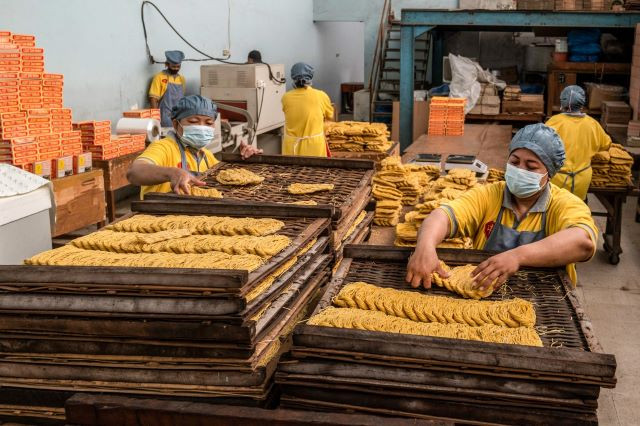Popular Reads
Top Results
Can't find what you're looking for?
View all search resultsPopular Reads
Top Results
Can't find what you're looking for?
View all search resultsAgus Widodo: Popularizing Indonesian traditional massage
(JP/Simon Sudarman)Various herbal medicines or jamu, notably grated ginger as one of the preparations for massage, were among the products and materials on display at the Traditional Jamu Festival held in Semarang, Central Java, in the middle of September
Change text size
Gift Premium Articles
to Anyone
 (JP/Simon Sudarman) (JP/Simon Sudarman)
(JP/Simon Sudarman) (JP/Simon Sudarman)
(JP/Simon Sudarman)
Various herbal medicines or jamu, notably grated ginger as one of the preparations for massage, were among the products and materials on display at the Traditional Jamu Festival held in Semarang, Central Java, in the middle of September.
'Massage has become part of my life. I never tire of doing it and introducing it to everybody. I'm always happily performing my job and willing to cooperate so that everything goes well,' said Agus Widodo while massaging a patient at his pavilion, the Widjaya Training Center of Jepara, Central Java.
The masseur, who comes from Blora in Central Java, and his 10 assistants were ready to serve their clients at the event. Meanwhile, Agus himself has been invited to different regions in the country to demonstrate his expertise in Indonesian massage, particularly traditional Javanese techniques.
According to Agus, whenever he works, he assures his patients that Indonesian massage causes no pain, involves no malpractice and is effective in combating various diseases in combination with Indonesian herbal medicines. Plus, the cost is only Rp 30,000 (US$2.6) per massage.
The vocational high school graduate is concerned about the growth of modern massage methods from other countries, although he has also mastered reflexology, acupressure, Chinese massage and other systems.
'We shouldn't be tempted to use modern techniques too easily because our own traditional massage is very effective, and genuine Indonesian herbal drugs have no side effects. Never be inclined to believe that foreign methods are better before getting to know our traditional system,' advised Agus.
Born into a family of traditional healers, Agus learned about massage as a child from his mother, Sutiyem, and also his grandfather, Marto Walidi, a famous masseur of his time. Later, he developed his own skills to help cure or bring relief to sufferers of a number of conditions, such as fatigue, muscle pain, broken bones, excessive uric acid, diabetes, liver damage, stroke and heart trouble. He also began to offer massage for infants.
Forty-five-year-old Agus has always been prepared to give his time in areas he visited by providing instruction and training in traditional massage. For greater effectiveness, he established in 2002 a social institution called the Widjaya Massage and Medicinal Herb Training Center, which is located in Jepara.
As the founder and chairman of the Widjaya training center, Agus also collaborates with people from various circles, including both the private sector and local governments, especially the Central Java provincial administration, which requires that the center turn out at least 10,000 masseurs.
'We also have the social mission of creating employment, mainly for reliable traditional masseurs and masseuses. So, given that traditional massage is already deep-rooted in Indonesia, I'm sure this cultural heritage will be preserved,' said Agus, who received an award for merit from the youth and sports minister in 2012.
In an attempt to raise awareness of traditional massage among the public and other stakeholders, Agus and his assistants attended the sixth ASEAN Para-Games in Surakarta, Central Java, in 2011, which saw the involvement of 27 trained masseurs from the Widjaya center.
'We have been invited again to work at the upcoming ASEAN Para-Games, which is scheduled for December this year,' revealed Agus, who was referred to in 2010 as 'P4I' (Pelopor Penemu Pencipta Pemijat Indonesia or the Pioneer, Founder and Creator of Indonesian Masseurs) by the Indonesian Institute of Sciences (LIPI).
The method of massage taught at Agus' training institution includes reflexology, acupuncture and acupressure in addition to traditional massage. 'We also have available support preparations, such as ginger oil, bee oil and coconut oil. After we give someone a massage, we offer them a natural, jamu drink to help them feel refreshed and fit. For example, a drink may contain eggs with turmeric and ginger, rice and galingale, and hot brewed ginger, all using Indonesian herbs and spices without preservatives or other chemicals,' Agus said.
From 2002 to 2010, the Widjaya center grew rapidly and had trained more than 1,720 masseurs and masseuses. The students who have immersed themselves in Agus' training course have come from Central, East and West Java, Jakarta, Bali, Medan, Lampung and other regions.
'I want to show that traditional Indonesian massage can match the different types massage from other countries,' he said with conviction. And, in fact, the opportunity for him to prove his point appeared.
At the National Exhibition of Appropriate Technology in Central Java in 2009, which was opened by President Susilo Bambang Yudhoyono, Agus' training center, under guidance from the provincial health agency, received orders from Malaysia and Brunei Darussalam to provide them with massage practitioners.
'Malaysia alone requested 1,000 masseurs from us. I rose to the challenge as a way to prove that Indonesian traditional massage can be accepted overseas,' he said. Since then, further requests for masseurs have come from other countries including Australia, Germany, Saudi Arabia, Singapore and the United States.
'The training we offer is available at several levels of competence, namely primary, skilled, proficient and master levels. Therefore, traditional Indonesian massage is not inferior to the other systems used overseas,' said the father of four, who won an Indonesian Museum of Records (MURI) award for massage in Blora in 2012.









